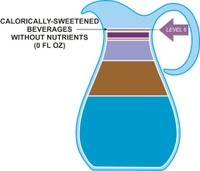Level 6

Calorically Sweetened Beverages
The beverages least recommended by the Panel are calorically sweetened beverages with high energy density and no (or very small amounts of) other nutrients. These include carbonated (fizzy) and noncarbonated (still) beverages, usually sweetened with high-fructose corn syrup or sucrose. Our recommendation is to consume calorically sweetened soft drinks and “juice drinks” sparingly. Caloric sweeteners have been linked to dental caries, increased energy intake, weight gain, and an increased risk of type 2 diabetes. In the quantities consumed today, soft drinks and fruit drinks most likely contribute to the obesity epidemic by facilitating excess energy intake. Animal and human studies exist showing that these beverages are not satiating, and compensation in terms of reduction in the intake of other foods and beverages is poor, with increased energy intake and obesity being the net result. Other research suggests soft drinks are replacing milk in the diet.
The Panel recommends at most one serving of calorically sweetened beverages or 0 to 8 fluid ounces daily.
Calories and Caffeine Content of Calorically Sweetened Beverages
| Colas and Teas |
Calories*
|
Caffeine
(mg)**
|
| Pepsi-Cola |
150
|
38
|
| Coca-Cola Classic |
156
|
35
|
| Nestea Cool |
123
|
17
|
| Lipton Original
Iced Tea |
90
|
30
|
| Arizona Green
Tea |
105
|
15
|
| Fruit Drinks |
Calories*
|
Caffeine
(mg)**
|
| Tropicana Fruit Punch (3% Juice) |
165
|
38
|
| Fruitopia (10% Juice Varieties) |
165
|
35
|
| Kool-Aid
Splash Grape Berry Punch |
174
|
17
|
| Jamba
Juice, Banana Berry Smoothie |
234
|
30
|
|
*Amount per 12 oz. (354.882ml) serving
**Amount per 12 fl. oz. (335ml) serving |
||

